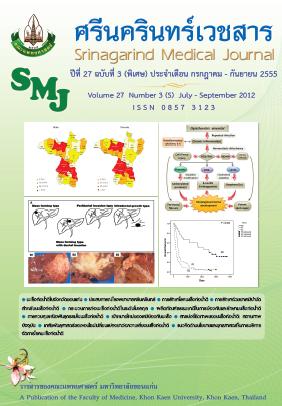Novel Targets for Cancer Chemoprevention in Cholangiocarcinoma
Keywords:
เคมีป้องกันมะเร็ง, สารเคมีป้องกันมะเร็ง, มะเร็งท่อน้ำดี, cancer chemoprevention, chemopreventiveagents, cholangiocarcinomaAbstract
Cholangiocarcinoma (CCA), originating from thecholangiocytes, is a common cancer and cause of deathreported in Northeastern Thailand. Obstacles to promptdiagnosis and effective treatment lead to poor prognosisand low 5-year survival rate of CCA. New strategies aimedto decrease cancer incidence and increase therapeuticresponse, including screening and prevention programmes,have been asked for proof and evidence. This articlebriefly reviews the role of cancer chemoprevention in CCA,particularly strategy targeting at redox control andantioxidant system and also current reports of the cancerchemoprevention in CCA. Two important cytoprotective andantioxidant enzymes, NADPH-quinone oxidoreductase-1(NQO1) or heme oxygenase-1 (HO1), have been focusedon their roles in cancer chemoprevention of CCA. Reducedtumor number and size of CCA, suggesting improvedsystemic chemotherapeutic response, has been shown inan experimental model when either enzyme is suppressed.These studies accelerate further efforts to developa new cancer chemoprevention strategy targeting at redoxcontrol and antioxidant system for prevention of CCAand improvement of chemotherapy the response.However, further clinical trials in human of cancerchemoprevention for CCA are needed to support thistheory.
Keywords : cancer chemoprevention, chemopreventiveagents, cholangiocarcinoma




